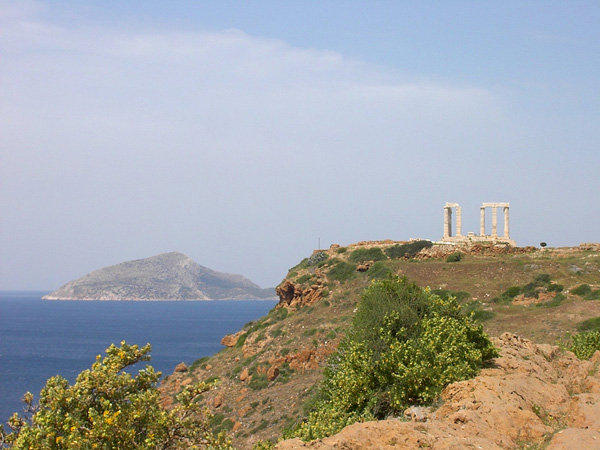Classroom Resources
Teach Through Educational Travel: Temple of Poseidon
Percy Jackson, the Minotaur, The Odyssey, the naming of the Aegean sea, death, voyages, an English poet, and, of course, a Greek god – what do they all have in common? One of the most recognizable spots in Greece – the Temple of Poseidon at Sounion. Poseidon is the Greek god of the sea, and is celebrated and revered throughout Greece and its environs. This spot in Sounion, on a high promontory on sheer cliffs overlooking the Aegean Sea, is a perfect place to honor Poseidon. It’s also a place immortalized in history and literature.

- View this student presentation on the Temple of Poseidon. Several weeks ago, my mom and aunt swam at the beach (known locally as Kavokolones) in Sounion, after a late dinner. The Temple of Poseidon glowed in the moonlight. Discuss how the town of Sounios has benefitted through the ages, both financially and aesthetically, from being home to the Temple of Poseidon.
- Watch this video about the Temple of Poseidon. What surprises you most about the Temple of Poseidon? If you could, would you carve your name into that ancient stone, as Lord Byron did?
- Take a panoramic look at the Temple of Poseidon (once on this site, you can see many different views of the temple area), and then the Temple of Athena. Is it any wonder that Athena was angry at Poseidon, for having a temple with a much better location (and audience)? Why do you think people, throughout the ages, have believed in mythology of one sort or another?
Related Articles

The 2024 WorldStrides Student Photo & Video Contest Gallery
Percy Jackson, the Minotaur, The Odyssey, the naming of the Aegean sea, death, voyages, an English poet, and, of course, a Greek god – what do they all have in common? One of the most recognizable s...

Girl Scouts: Costa Rica Tour
Percy Jackson, the Minotaur, The Odyssey, the naming of the Aegean sea, death, voyages, an English poet, and, of course, a Greek god – what do they all have in common? One of the most recognizable s...

2024 Mérida Pride Parade
Percy Jackson, the Minotaur, The Odyssey, the naming of the Aegean sea, death, voyages, an English poet, and, of course, a Greek god – what do they all have in common? One of the most recognizable s...

Rise Up, Take Action: How to Support the LGBTQIA+ Community
Percy Jackson, the Minotaur, The Odyssey, the naming of the Aegean sea, death, voyages, an English poet, and, of course, a Greek god – what do they all have in common? One of the most recognizable s...


